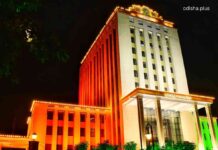Suresh Chandra Sarangi
Gandhiji visited Odisha for the first time in the year 1922 and this article is written to commemorate 100 years of Gandhi’s sojourn to our state.
Mahatma Gandhi, the father of our Nation was an apostle of non-violence and would go down in history as an individual who brought the soul force to the regimen of political discourse and defined the contours of politics that will have an abiding effect on mankind forever. This was a powerful instrument that could de-escalate tension and resolve conflicts.

This tool, an ideal creation, is based on Indian philosophy. Hinduism, Jainism, and Buddhism had a lot of influence on Mahatma Gandhi’s life that shaped his thinking. Whether it is the Russia – Ukraine war, or for that matter any other war that uses brute force of violence, has left in its trail of death, destruction, horror, and frustration of immense magnitude. What the world needs to do is to emulate Gandhi’s theory of non-violence to bring ultimate peace and stability, in a world which is sitting on a stockpile of nuclear weapons.
Gandhi’s theory of non-violence was influenced by the tenets of Jainism which believes that non-violence is of the greatest order, whether it is within the human community or any other living creatures. Buddha’s philosophy also transformed Gandhiji into a person who glorified high ideals of non – violence. The Bhagavad Gita metamorphosed Gandhi with its Godly prescription in search of Dharma.

All these came into fruition during Gandhiji’s 19 years stay in South Africa, when he opposed racial discrimination and understood the potency and efficacy of such a moral force, and he poised to put passive resistance against the greatest autocrats.
Truth and non-violence, Gandhi said, were the twin pillars upon which stood the magnificent edifice of State. Gandhiji had said that he is not preaching anything new. “Truth and non-violence is as old as mountains.” The Hindu philosophy says “Ahimsa paramo dharma” is a truism that non-violence becomes the most potent weapon today in a world which is affected by continuous conflict, influenced by bigotry, hatred, and divisiveness.

Mankind had never witnessed the scale of violence and its debilitating influence threatening the very existence of human civilization. We, certainly, face an existential crisis, never seen earlier in the history of mankind, and thus the relevance of non-violence is more emphatic now.
Gandhiji wrote, “I do believe that where there is a choice between cowardice and violence, I would advise violence.” Non-violence is infinitely superior to violence and forgiveness is more powerful than the power to punish, thus echoing Jesus Christ. He was of the strong opinion that strength does not come from physical superiority and brute force. It comes from the indomitable human spirit. Enlightened forgiveness is a mighty weapon and mightier than the sword. History is replete with examples like the conversion of Chandashoka to Dharmashok after the Kalinga war where the river Daya became a river of blood.
Satyagraha and its offshoots, Gandhi reclaimed are nothing but new names of suffering and renunciation so well practised by the rishis and sadhus of India from time immemorial.

Non-violence in its dynamic form means conscious suffering. The hypothesis never means that it is a meek submission to the will of evildoer, but rather putting one’s own soul against the brute force of the tyrant. It is interpreted that non-violence is the victory of spiritual force over physical strength.
During the course of the Independence movement, Gandhiji had a difference of opinion with Netaji Subhas Chandra Bose who wanted his Azad Hind Fauj to fight the mighty British Empire. But, Gandhiji was of a different opinion. He pronounced that violence would only beget violence and the powerful British colonialist would make the Indian soldiers powerless through the modern arms and ammunition. To avoid bloodshed, he propagated non-cooperation and passive resistance. Thus, Satyagraha became a powerful weapon without bloodshed and the Britishers bowed down culminating In India’s freedom.

Gandhi’s philosophy of non-violence showed to the world a new way of waging war against an unjust government, management, tyrants, and autocrats. A fist of Salt in the historical Dandi march sent shockwaves against the colonial power and became the symbol of emancipation in the entire world.
Whether it is freedom from foreign yoke or emancipation from social discrimination. Martin Luther King, Nelson Mandela, Rosa Parks, Mother Teresa spearheaded the struggle and became victorious. Gandhiji, whom Churchill said a half-naked Fakir brought a revolution that triggered hundreds of colonised countries to wage war against foreign rule and to get emancipated.
Non-violence will long live as a beacon guiding mankind in its journey against exploitation. This is the soul force of the spiritually strong who will inherit the Earth.
(Suresh Chandra Sarangi is former General Manager, Bank of India, and lives in Bhubaneswar. Views are personal)
#Gandhiji #MohandasKaramchandGaandhi #Bapuji #Fatherofthenation #Satyagrah #Dandimarch #nonviolence #violence #Netaji #SubhasChandraBose #AzadHindFauj





















